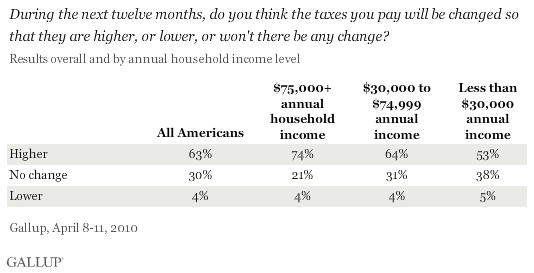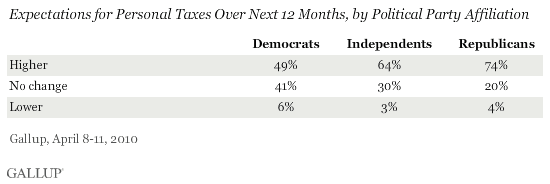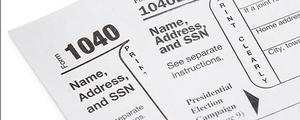PRINCETON, NJ -- Sixty-three percent of Americans believe their taxes will increase in the next 12 months, while 4% expect a change that will reduce their taxes. Majorities of all income groups share this view, though it is more common among Americans in upper-income households.

Americans in most demographic groups widely expect their taxes to increase over the next year, but there is pronounced variation among income groups, as noted, and by political party affiliation.
Specifically, 74% of Republicans expect their taxes to go up, as do 64% of independents. A proportionately lower 49% of Democrats share that view, but it is still the most common response within the group. Forty-one percent of Democrats expect their taxes to remain unchanged, and 6% think theirs will go down.

Expectations for a tax increase among the general U.S. population are much more common now than when Gallup last asked this question, in late 1994 -- after Republicans won control of both houses of Congress in that year's midterm elections. At that time, 35% expected their taxes to go up, 20% expected them to go down, and the plurality of 41% expected no change.
Gallup also asked the question during the Carter presidency, in April 1978 -- a year and three months into the Carter administration, which is the amount of time the Obama administration has been in office to date. At that time, Americans' expectations for their taxes were similar to what Gallup finds today: 60% expected their taxes to go higher, 7% expected them to go lower, and 25% thought they would stay the same.
Bottom Line
President Obama cut federal income taxes for low- and middle-income Americans in the economic stimulus plan, and is looking to extend the Bush-era tax cuts on middle-income families in his 2011 budget; still, a majority of people in low- and middle-income households expect their taxes to be raised over the next 12 months.
Although the question in the current poll does not specifically mention federal income taxes, it was (and has in the past been) asked after a series of questions on income taxes, such as those reported here. Thus, respondents are most likely thinking in terms of changes to their federal income taxes rather than state or local taxes.
Despite the president's tax policies to date and his plans for the future, middle- and lower-income Americans may perceive that the federal government will need to raise taxes to pay for its greater spending and rising deficits since Obama took office, including the recently passed healthcare legislation, with its price tag of just under $1 trillion.
Survey Methods
Results are based on telephone interviews with a random sample of 1,020 national adults, aged 18 and older, conducted Month Day-Day, 2010. For results based on the total sample of national adults, one can say with 95% confidence that the maximum margin of sampling error is ±4 percentage points.
Interviews are conducted with respondents on land-line telephones (for respondents with a land-line telephone) and cellular phones (for respondents who are cell-phone only).
In addition to sampling error, question wording and practical difficulties in conducting surveys can introduce error or bias into the findings of public opinion polls.
